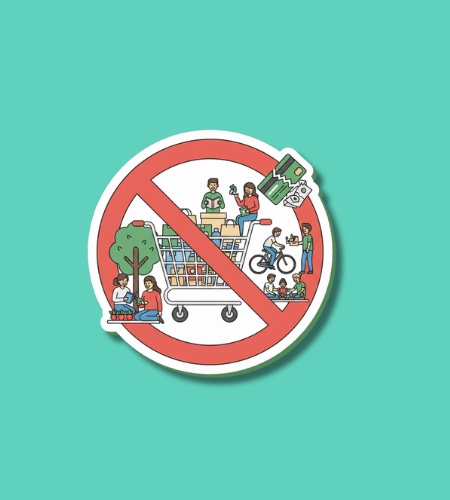The Buy Nothing Day, observed on the day after Thanksgiving (traditionally one of the busiest shopping days of the year), is a global protest against consumerism and over-consumption.
Table of Contents
History of Buy Nothing Day
The idea was conceived in 1992 in Vancouver, Canada by artist Ted Dave, as a way for society to pause and reflect on its consumption habits.
By 1997, the observance had been shifted to the Friday after U.S. Thanksgiving (a.k.a. “Black Friday”) and had spread to multiple countries as a cultural action day.
Why is Buy Nothing Day important?
Buy Nothing Day challenges the assumption that purchasing more is always better. It raises awareness about the social, environmental and economic consequences of unchecked consumerism—particularly when mass shopping becomes a holiday ritual.
It also invites individuals to consider alternatives to consumption: sharing, repairing, giving rather than buying, and supporting more sustainable lifestyles.
- It encourages a 24-hour break from shopping to reflect on consumption.
- It highlights the impact of shopping culture on the planet and communities.
- It questions whether we buy things we need or simply buy because the moment demands it.
- It fosters alternative values like reuse, sharing, and community over acquisition.
- It connects a local act (not buying) with a global statement about sustainability.
How to Observe Buy Nothing Day
Observing Buy Nothing Day means pausing the routine of purchasing and instead doing something mindful with that time, money or energy. You can join a local action or simply commit to not buying anything non-essential for 24 hours. Use the day to reflect, share, repair or connect.
For example: turn off shopping apps, avoid browsing sale ads, opt to walk or talk rather than shop, or exchange items with friends instead of buying new ones.
- Commit to purchasing only essential items (medicine, food, etc.) and skip everything else.
- Spend the time with family or friends without the distraction of stores or online shopping.
- Repair or repurpose items you already own instead of buying replacements.
- Share with others what you did instead of bought—swap clothes, tools, books or experiences.
- Reflect on your consumption habits: ask “ Do I need this? ” before your next purchase.
Subscribe to our newsletter and never miss a holiday again!

